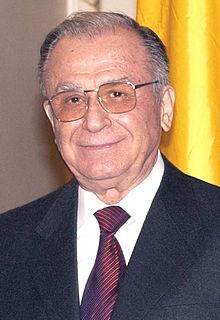Ion Iliescu
Ion Iliescu ( ; born March 3, 1930 in Oltenița ) is a Romanian politician. He was President of Romania from December 1989 to 1996 and from 2000 to 2004 .
Life
Iliescu's father was a railroad worker and became a communist. In 1931 he attended a party congress in the Soviet Union , spent four more years there, and was arrested on his return. Ion Iliescu grew up with his grandparents and spent his school days in Oltenița and Bucharest . He studied electrical engineering at the Bucharest Polytechnic University and in Moscow , where the future Foreign Minister Ana Pauker stood up for him. In 1948 he was a co-founder of the Romanian Student Union. He later visited other educational institutions in Romania and is among other things an honorary doctorate from the Timișoara Polytechnic University .
He has been married to his wife Nina since 1951.
Iliescu initially worked in the field of hydro energy and water management, later as a research engineer in metallurgy. From 1979 he headed the Office for Water Resources, but spoke out against the major projects of the dictator Nicolae Ceaușescu and had to give up his office in 1984.
Political activity
In the Ceaușescu era, Iliescu was a member of the Communist Party of Romania (PCR) and Minister for Youth from 1967 to 1971. In 1971 he became secretary of the Central Committee . Accused of "intellectual deviation" during the Cultural Revolution, he lost his party office and was Vice President of Timiș County from 1974 to 1979 . From 1984 to December 1989 he was director of the publishing house for technical literature in Bucharest and advocated a cautious opening to the West.
After the shooting of Nicolae Ceauşescu on December 25, 1989, Iliescu was provisionally appointed President of the Front for National Rescue (FNR) . On May 20, 1990, he was confirmed in the first free elections with 85% of the vote. The election was accompanied for days by protests on the University Square in Bucharest , but miners from the Jiu Valley summoned by Iliescu then violently disbanded them (" Mineriades "). Six civilians died, who were beaten to death by angry miners. Many people were injured. In October 1992 he was re-elected in office with 61% of the vote.
In 1996 Iliescu lost the presidential election to Emil Constantinescu . He became a senator for the Socialist Party (PDSR) and in 1997 its party leader. On December 10, 2000, he prevailed in the presidential runoff election against the ultra-nationalist Corneliu Vadim Tudor with 66.8 percent of the vote. His term of office lasted until December 2004 - his successor was the former Bucharest mayor Traian Băsescu after the elections on December 12, 2004 . As one of his last official acts on the day before the presidency was handed over to his successor, Ion Iliescu pardoned the leader of the miners' uprisings ( Romanian Mineriadă ), Miron Cozma. Iliescu withdrew this pardon on the same day because of strong political and public protests. Miron Cozma was arrested again shortly after his release.
Ion Iliescu is named in the report of the investigator of the Council of Europe on illegal activities of the US secret service CIA in Europe, Dick Marty , as one of the persons who authorized or at least knew about and are responsible for secret torture prisons at the military base Mihail Kogălniceanu . On April 27, 2015, Iliescu admitted on his own blog that in 2002 he had given the CIA so-called "black sites" for the secret interrogation of terror suspects. He claims not to have known anything about the torture of the prisoners. He also denied that the "sites" were a consideration for Romania joining NATO in 2004.
Iliescu was charged with his role in the 1989 revolution. In the so-called "Process of the Revolution", which began on November 29, 2019, Iliescu and Dan Voiculescu are currently on trial. They are accused of creating a kind of “terrorist psychosis” during the revolution of 1989 with “an extensive campaign of disinformation” about forces allegedly loyal to Ceaușescu and subsequently provoking conditions similar to civil war in order to “gain legitimacy in the eyes of the population ". At this point the dictator couple Ceaușescu had already been disempowered; three quarters of the victims of the uprising died in shootings and street fighting, murdered by alleged terrorists. The trial was postponed to February 20, 2020 due to procedural errors. [outdated]
Iliescu published several essays and books, including a. “Revolution and Reform” (1993), “Moments of History” (1996) and “Whereto, Romanian Society?” (1999, on a social democratic future).
See also
Individual evidence
- ↑ Ion Iliescu împlineşte azi 88 de ani , Adevărul March 3, 2018
- ^ Dick Marty: Secret detentions and illegal transfers of detainees involving the Council of Europe member states: second report. In: assembly.coe.int of June 7, 2007 (PDF; 813 kB).
- ↑ Former Romania president admits Allowing CIA site . In: Aljazeera of April 28, 2015.
- ^ Former President Ion Iliescu charged in Romania. dw.com from December 21, 2018.
- ↑ Keno Verseck : Trial of the overthrow of the Ceausescu dictatorship. Romania's revolution comes to justice. In: spon.de from December 24, 2019.
- ^ First day of trial at the Supreme Court in the 1989 Revolution process. Ion Iliescu charged with crimes against humanity. In: Allgemeine Deutsche Zeitung für Romania from December 3, 2019.
Web links
- Literature by and about Ion Iliescu in the catalog of the German National Library
| personal data | |
|---|---|
| SURNAME | Iliescu, Ion |
| BRIEF DESCRIPTION | Romanian politician |
| DATE OF BIRTH | March 3, 1930 |
| PLACE OF BIRTH | Oltenița |

